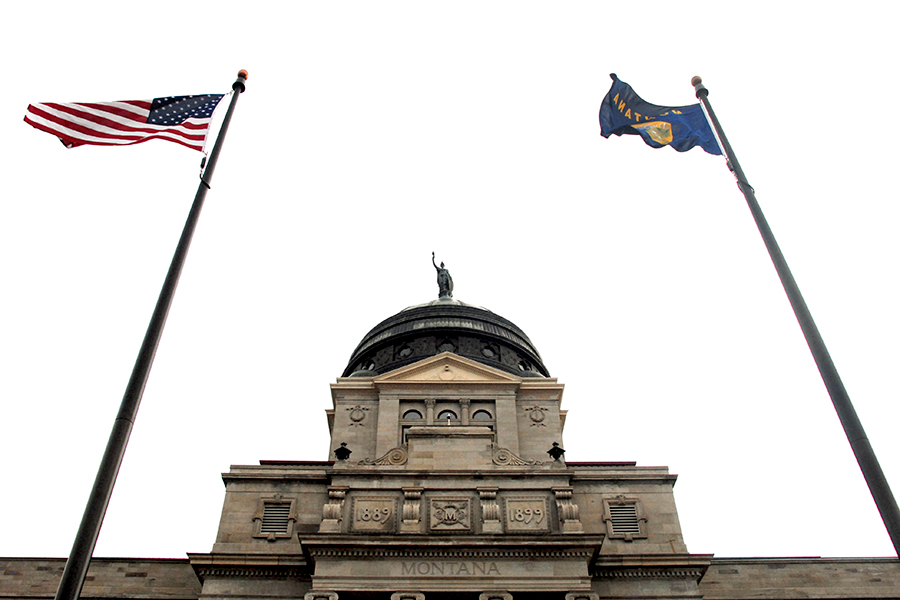HELENA – Dozens of people gathered on the Montana Capitol steps Monday for a rally to urge residents to contact their representatives and express opposition to several bills moving through the Legislature, including one the LGBTQ community and its allies argue could be used to justify discrimination.
“The folks in the building behind me were hoping they could steal your rights and no one would notice,” Democratic Sen. Bryce Bennett of Missoula, the first openly gay man elected to the Montana Legislature, told the crowd. “There is too much on the line to sit on the sidelines. We have to organize like never before.”
Several in the crowd waved rainbow flags and carried signs. One read: “I support the separation of church and hate.”
Republican Sen. Carl Glimm of Kila is sponsoring the bill that has already passed the Senate to create the Religious Freedom Restoration Act. It would allow people to challenge government regulations that interfere with religious beliefs. The government would then have to prove its actions are justified by a compelling interest and are being accomplished by the least restrictive means possible.
Such laws have been used to prevent things like criminal prosecution of Native Americans for possessing eagle feathers for religious reasons and to prevent schools from requiring Native American children to cut their hair in violation of their religious beliefs, Glimm said. Opponents argue the state and federal constitutions and court rulings already protect religious liberties.
The LGBTQ community argues that such a law could be used to challenge ordinances in several Montana cities that prohibit discrimination based on gender identity. Similar attempts have been made in other states.
Montana’s Human Rights Act does not specifically prohibit discrimination based on gender identity. This year, with a Republican majority in the Legislature and a GOP governor for the first time in 16 years, organizers decided not to seek a sponsor to make another attempt at expanding the act.
“We knew we were just going to spend every waking hour trying to defeat the things they were going to come for us with,” said Kelsen Young, executive director of the Montana Coalition Against Domestic and Sexual Violence.
“Before, we had a Democratic governor, so even if these bills passed, there was always a goalie to block them,” said Adrian Jawort of Billings, a transgender woman who lobbies for Montana Native Voice. “The most you can do is just throw up all the defenses you can and make your voices heard,” and to try to appeal to their conscience.
The LGBTQ community and its allies are also opposing bills that would prevent transgender girls and women from participating in school sports programs, would require transgender people to have surgery and obtain a court order before being able to change the gender marker on their birth certificate and to prevent doctors from performing surgery on minors to treat gender dysphoria — which pediatricians have said really isn’t happening in Montana.
“The argument that these are about public policy or protecting youth or monitoring and regulating the health care industry … is just false,” said SK Rossi of Missoula, a lobbyist for the cities of Bozeman and Missoula, which have nondiscrimination ordinances. “They are about making lives harder for trans people. They’re about pushing trans people further and further out of society, and pushing us out of Montana.”
It’s been a difficult session for members of the LGBTQ community, who feel like they’re “begging for their basic human rights to people, mind you, that we have to interact with every day,” Young said recently.
“As a woman, married to a woman, … many of these attacks aren’t as directly coming at us,” Young said, “they’re coming at members of our community who are trans, nonbinary and two spirit,” a term referring to transgender Native Americans.
“Imagine how hard it is for them to get up there (and testify on bills), when they’re misgendered, names are mispronounced, just all of the ways in which our basic human dignity and right to be there and have our voices heard gets undermined in these really small and sometimes insidious ways. And sometimes overtly.”
During a hearing on the religious freedom bill in the House Judiciary Committee last week, two Republican lawmakers reacted approvingly to testimony that the bill would drive LGTBQ Montanans to leave the state, several people reported.
Rossi expressed frustration with Republicans who are “not interested in pursuing these issues, but who also can’t find it in their hearts to stand up and stop these bills with Democrats.”
Glimm also brought the bill requiring a person to have gender reassignment surgery before changing the sex on their birth certificate. He argued, in part, that the state health department overstepped its authority in changing the designation on a birth certificate from “sex” to “gender” and then in setting rules for how it could be changed.
Birth certificates contain vital statistics and should be based on the facts at the time of birth, he argued.
“This has nothing to do with statistics or making sure that information in some bureaucrat’s drawer is accurate to what you think it should be,” Bennett said on the Senate floor. “This is a bill about going after a population that is already struggling in this state and they want one simple thing, on a piece of paper they want a letter to change.”
